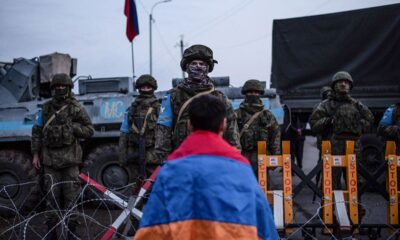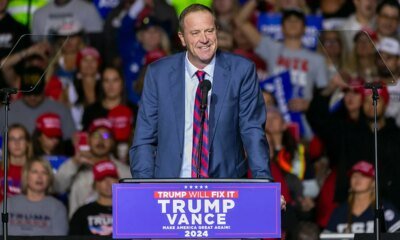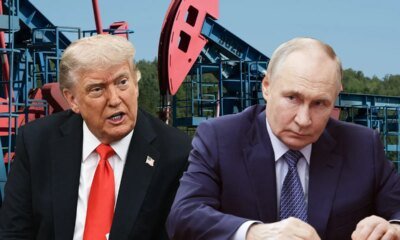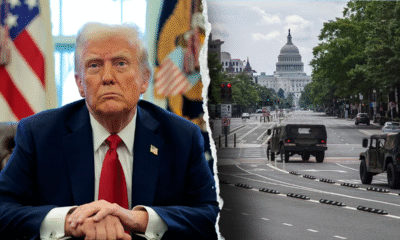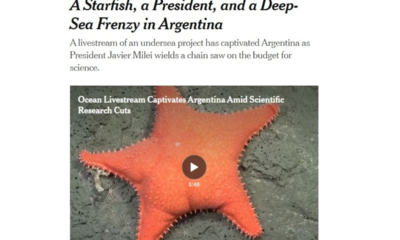INTERNACIONAL
Trump admin cheers ‘important steps’ as Paraguay targets Iran and its terror proxies
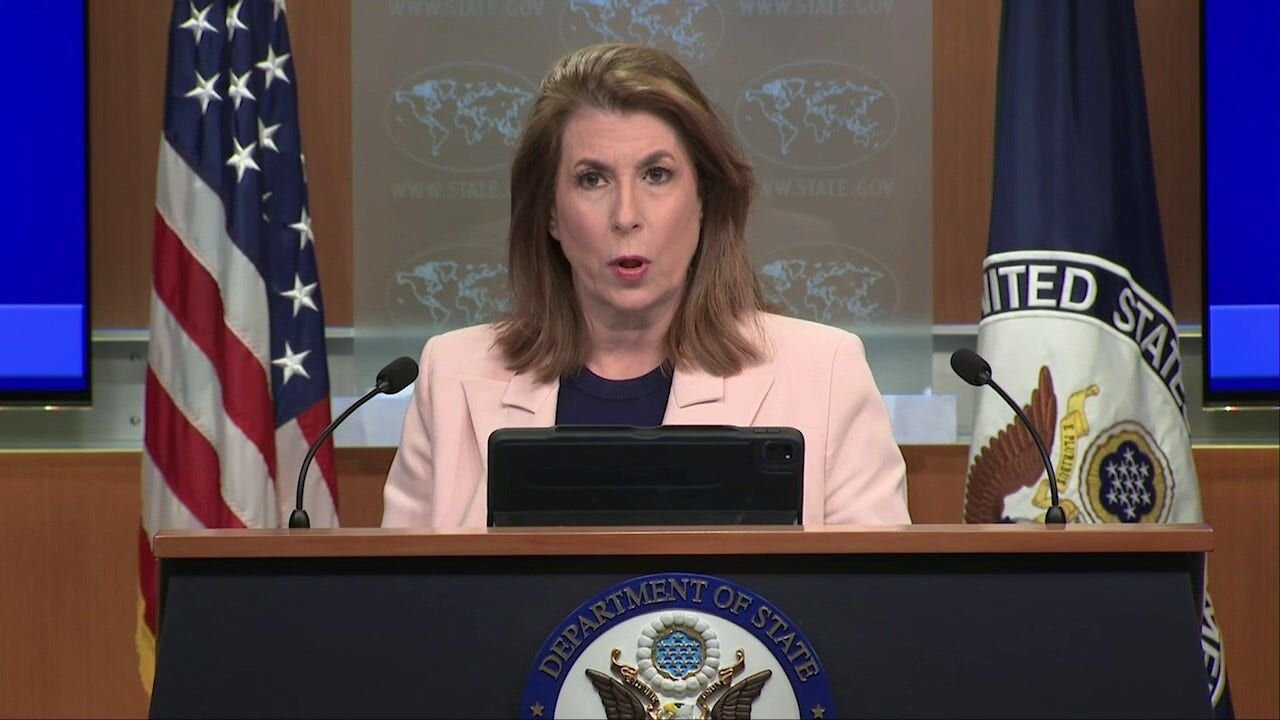
The Trump administration is applauding a major move by a key South American ally in the global fight against terrorism.
On Thursday, the U.S. State Department issued a statement congratulating Paraguay’s President Santiago Peña for officially labeling Iran’s Islamic Revolutionary Guard Corps (IRGC) a terrorist organization – a decision the U.S. calls a critical blow to Iran’s terror network in the Western Hemisphere.
«The United States welcomes President Santiago Peña’s designation of Iran’s Islamic Revolutionary Guard Corps (IRGC) as a terrorist organization,» said State Department spokesperson Tammy Bruce.
In addition to the IRGC designation, Paraguay also expanded its 2019 designations of the armed wings of Hezbollah and Hamas to include the entirety of both organizations. The Trump administration hailed it as a firm stand against Iranian-backed extremism.
NUCLEAR WATCHDOG URGES ‘TRUST BUT VERIFY’ THAT IRAN ENGAGES IN GOOD-FAITH NEGOTIATIONS
The Trump administration praised Paraguay for designating Iran’s IRGC, Hamas and Hezbollah as terror groups, calling it a key move to cut off Tehran’s global terror reach. (NORBERTO DUARTE/AFP via Getty Images)
«Iran remains the leading state sponsor of terrorism in the world and has financed and directed numerous terrorist attacks and activities globally, through its IRGC-Qods Force and proxies such as Hezbollah and Hamas,» Bruce said.
The decision is particularly significant in the Tri-Border Area, the region where Paraguay borders Argentina and Brazil, which has long been considered a financial hub for Hezbollah-linked operatives. The State Department said Paraguay’s action will help cut off the Iranian regime’s ability to fund terrorism and operate in Latin America.
«The important steps Paraguay has taken will help cut off the ability of the Iranian regime and its proxies to plot terrorist attacks and raise money for its malignant and destabilizing activity,» Bruce added, highlighting the Tri-Border Area as a critical front in this effort.
TRUMP TEAM HOLDS ‘CONSTRUCTIVE’ FACE-TO-FACE NUCLEAR TALKS WITH IRAN, WILL MEET AGAIN NEXT WEEKEND
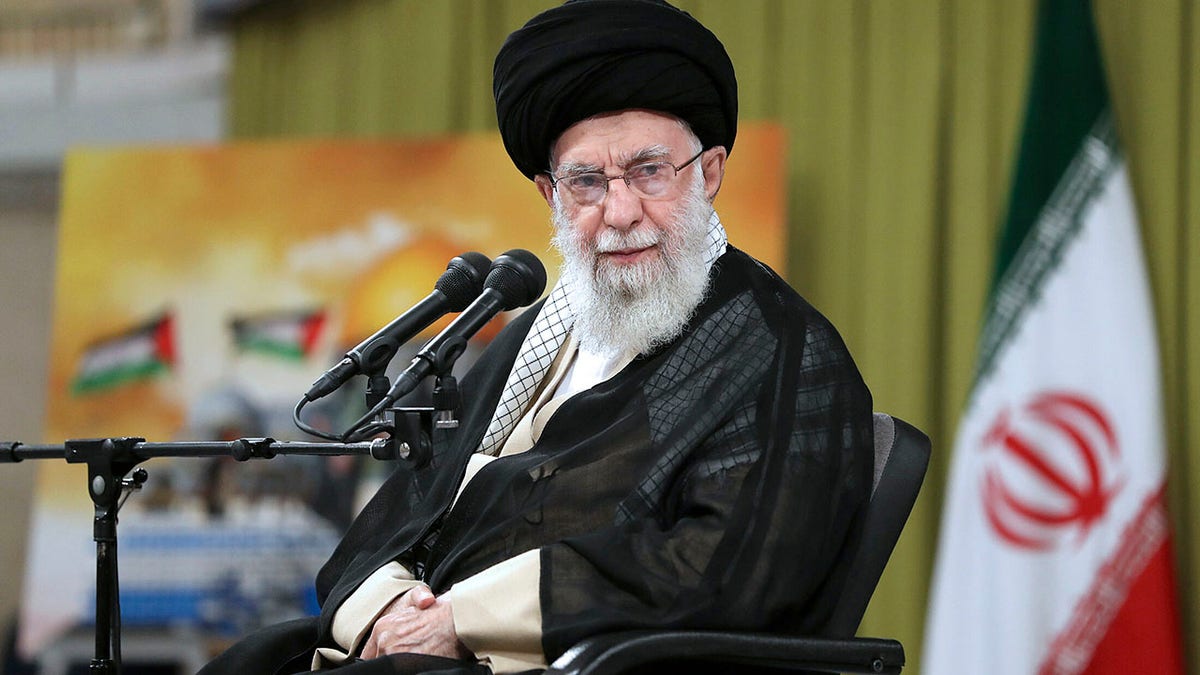
Iranian Supreme Leader Ayatollah Ali Khamenei attends a meeting with a group of students in Tehran, Iran, on Wednesday, Nov. 1. (Office of the Iranian Supreme Leader via AP)
The Trump administration said it plans to build on this momentum and continue working with allies to confront Iran’s global influence.
«The United States will continue to work with partners such as Paraguay to confront global security threats,» Bruce said. «We call on all countries to hold the Iranian regime accountable and prevent its operatives, recruiters, financiers, and proxies from operating in their territories.»
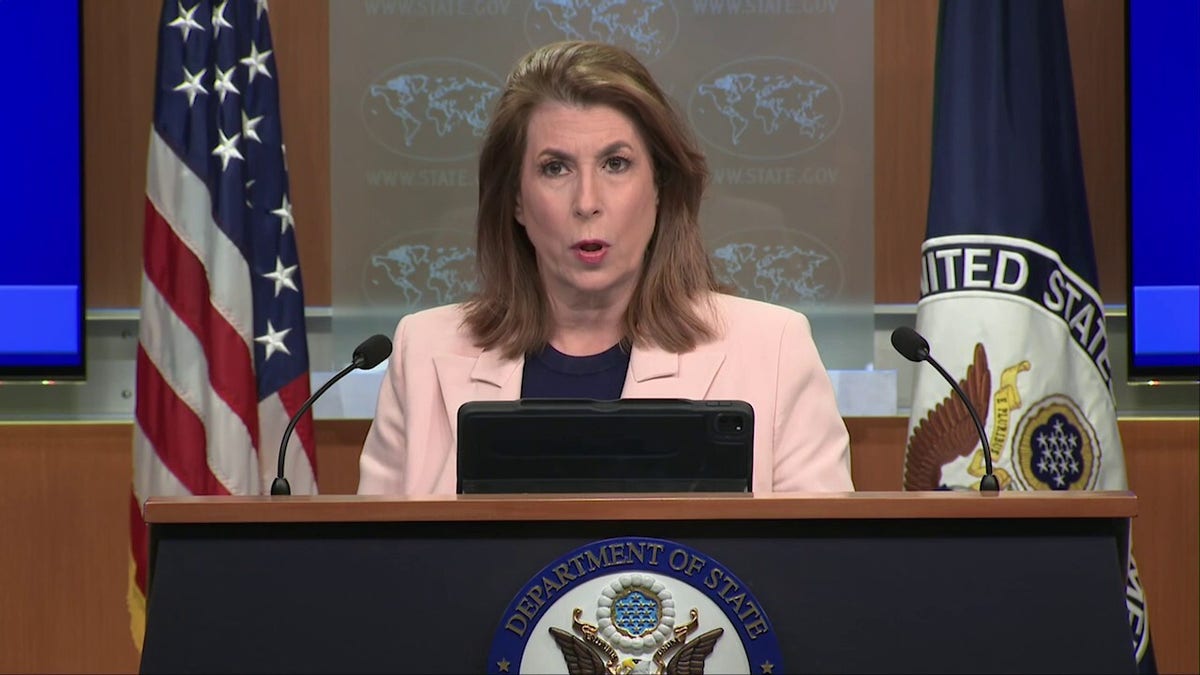
State Department spokesperson Tammy Bruce sent a warning to those who support foreign terrorist organizations like the Houthis. (State Department)
This isn’t a one-off. Since his first term, Trump has made confronting Iran’s terror apparatus a cornerstone of his foreign policy.
In 2018, he pulled the U.S. out of the Obama-era nuclear deal with Iran, known as the Joint Comprehensive Plan of Action (JCPOA), calling it «one of the worst and most one-sided transactions the United States has ever entered into.»
Now, the Trump administration is back at the negotiating table, but on its own terms. Two rounds of nuclear talks have already taken place this month, with a third scheduled for later this week. A senior administration official said the discussions have made «very good progress,» though the details remain closely guarded.
As Bruce emphasized, Washington is calling on «all countries» to follow suit in holding «the Iranian regime accountable.»
CLICK HERE TO GET THE FOX NEWS APP
The United States does not currently have a permanent Ambassador to Paraguay. Instead, Amir Masliyah holds the position of Chargé D’Affaires.
Fox News’ Caitlin McFall contributed to this report.
Terrorism,Iran,Donald Trump,State Department,South America
INTERNACIONAL
Trump ordenó al Ejército atacar a los cárteles de drogas aunque no estén en territorio de Estados Unidos
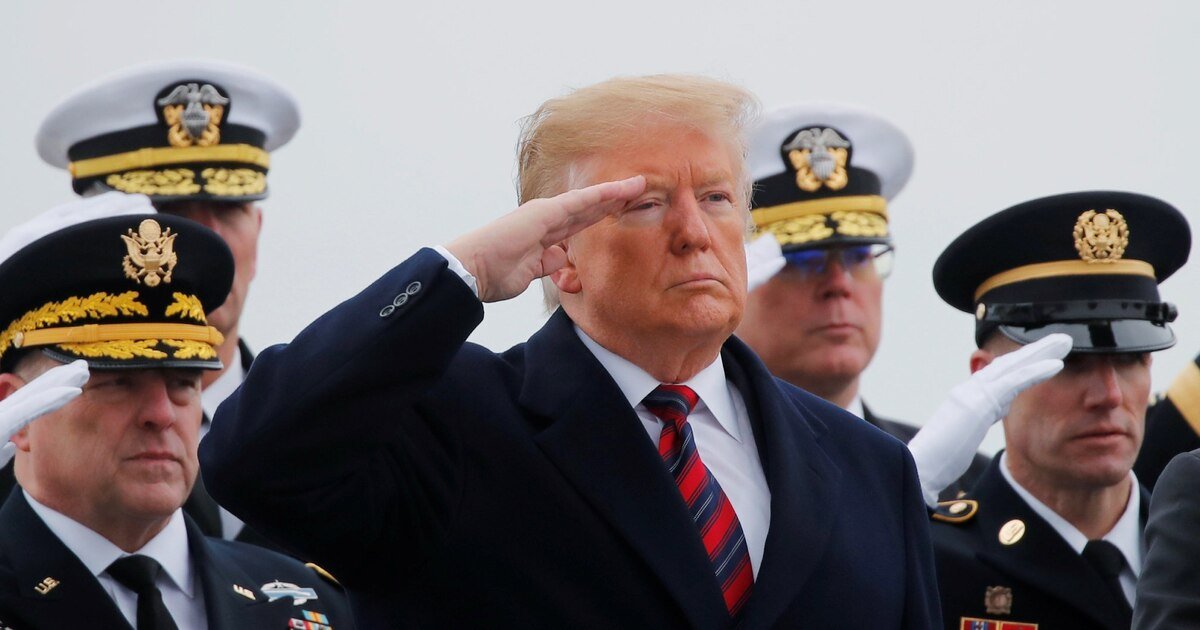
El presidente Trump firmó en secreto una directiva dirigida al Pentágono para comenzar a usar la fuerza militar contra ciertos cárteles de la droga latinoamericanos que su administración considera organizaciones terroristas, según personas familiarizadas con el asunto.
La decisión de incorporar a las fuerzas armadas estadounidenses a la lucha es la medida más agresiva hasta la fecha en la creciente campaña de la administración contra los cárteles. Indica la continua disposición de Trump a usar las fuerzas militares para llevar a cabo lo que se ha considerado principalmente una responsabilidad de las fuerzas del orden: frenar el flujo de fentanilo y otras drogas ilegales.
La orden establece una base oficial para la posibilidad de operaciones militares directas en el mar y en territorio extranjero contra los cárteles.
Oficiales militares estadounidenses han comenzado a elaborar opciones sobre cómo las fuerzas armadas podrían perseguir a los grupos, según informaron las personas familiarizadas con las conversaciones, que hablaron bajo condición de anonimato para poder hablar sobre las delicadas deliberaciones internas.
Sin embargo, ordenar a las fuerzas armadas que combatan el tráfico ilícito también plantea cuestiones legales, incluyendo si se consideraría “asesinato” si las fuerzas estadounidenses, actuando al margen de un conflicto armado autorizado por el Congreso, mataran a civiles, incluso a presuntos delincuentes, que no representan una amenaza inminente.
No está claro qué han dicho los abogados de la Casa Blanca, el Pentágono y el Departamento de Estado sobre la nueva directiva, ni si la Oficina de Asesoría Legal del Departamento de Justicia ha emitido una opinión autorizada que evalúe las cuestiones legales.
Este año, Trump ya ha desplegado a la Guardia Nacional y tropas en servicio activo en la frontera suroeste para frenar el flujo de drogas y de inmigrantes, y ha intensificado la vigilancia y las medidas de interdicción de drogas.
Cuando regresó a la presidencia en enero, Trump firmó una orden que ordenaba al Departamento de Estado que comenzara a clasificar a los cárteles de la droga como organizaciones terroristas extranjeras.
Trump ha atacado especialmente a las organizaciones venezolanas y mexicanas. En febrero, el Departamento de Estado designó al Tren de Aragua, así como a la transnacional Mara Salvatrucha (conocida como MS-13) y a varios otros grupos como organizaciones terroristas extranjeras, diciendo que constituían “una amenaza a la seguridad nacional más allá de la que plantea el crimen organizado tradicional”.
Hace dos semanas, el gobierno de Trump añadió al Cártel de los Soles de Venezuela a una lista de grupos terroristas globales especialmente designados, afirmando que está liderado por el dictador Nicolás Maduro de Venezuela y otros altos funcionarios de su administración.
El jueves, los Departamentos de Justicia y de Estado anunciaron que el gobierno de Estados Unidos duplicará la recompensa —a 50 millones de dólares— por información que conduzca al arresto de Maduro, quien ha sido acusado formalmente de narcotráfico. El gobierno lo describió nuevamente como líder del cártel, y la fiscal general Pam Bondi afirmó que “no escapará a la justicia y rendirá cuentas por sus abyectos crímenes”.
Al preguntársele sobre la autorización del Sr. Trump para el uso de la fuerza militar contra los cárteles, Anna Kelly, portavoz de la Casa Blanca, declaró en un correo electrónico que “la principal prioridad del presidente Trump es proteger la patria, razón por la cual tomó la audaz decisión de designar a varios cárteles y bandas como organizaciones terroristas extranjeras”.
El Departamento de Defensa se negó a comentar sobre la nueva directiva.
Los ataques militares unilaterales contra los cárteles representarían una marcada escalada en el largo camino para frenar el narcotráfico, colocando a las fuerzas estadounidenses en un papel de liderazgo en primera línea contra organizaciones a menudo bien armadas y bien financiadas. Una campaña sostenida también probablemente plantearía nuevos problemas relacionados con el intento del Sr. Trump de usar las fuerzas armadas de forma más agresiva para respaldar diversas de sus políticas, a menudo frente a restricciones legales y constitucionales.
La participación militar estadounidense en el pasado en la lucha contra las operaciones antidrogas en Latinoamérica ha superado en ocasiones los límites legales. Sin embargo, esas operaciones se presentaron como un apoyo a las autoridades policiales.
En 1989, el presidente George H.W. Bush envió más de 20.000 soldados a Panamá para arrestar a su líder, Manuel Noriega, quien había sido acusado en Estados Unidos por cargos de narcotráfico.
Antes de la operación, William P. Barr, quien entonces dirigía la Oficina de Asesoría Jurídica y fue fiscal general durante el primer mandato de Trump, redactó un polémico memorando en el que afirmaba que Bush tenía la autoridad para ordenar arrestos de fugitivos en el extranjero por parte de las fuerzas del orden sin el consentimiento de otros Estados. La Asamblea General de las Naciones Unidas condenó la acción panameña como una “flagrante violación del derecho internacional”.

/ AFP PHOTO / DSK
En la década de 1990, el ejército estadounidense colaboró con las fuerzas de seguridad antidrogas de Colombia y Perú compartiendo información sobre vuelos civiles sospechosos de transportar drogas, como datos de radar e intercepciones de comunicaciones. Sin embargo, después de que esos gobiernos comenzaran a derribar dichas aeronaves, la administración Clinton suspendió la asistencia durante meses en 1994.
La Oficina de Asesoría Jurídica emitió un dictamen que indicaba que los oficiales militares que proporcionaron dicha información, a sabiendas de que se utilizaría para derribar sumariamente esas aeronaves, podrían estar exponiéndose a un procesamiento posterior. El Congreso finalmente modificó la legislación estadounidense para permitir dicha asistencia.
La Armada ha participado desde hace tiempo en la interceptación de embarcaciones en aguas internacionales sospechosas de contrabandear drogas hacia Estados Unidos. Sin embargo, los buques de guerra suelen hacerlo como parte de una operación policial, bajo el mando de un oficial de la Guardia Costera estadounidense. Según una ley de 1878 llamada Ley Posse Comitatus, generalmente es ilegal utilizar a las fuerzas armadas para desempeñar funciones policiales.
Las fuerzas armadas estadounidenses también han realizado ejercicios conjuntos de entrenamiento antidrogas con otros países, incluyendo tropas colombianas y mexicanas. Asimismo, proporcionaron equipo y aeronaves a antiguos escuadrones de la DEA que asesoraron y se desplegaron con, e incluso participaron en combates con, agentes antidrogas locales en países como Honduras. El programa finalizó en 2017.
Pero la nueva directiva de Trump parece prever un enfoque diferente, centrado en que las fuerzas estadounidenses capturen o eliminen directamente a personas involucradas en el narcotráfico. Etiquetar a los cárteles como grupos terroristas permite a Estados Unidos “utilizar otros elementos del poder estadounidense, agencias de inteligencia, el Departamento de Defensa, o lo que sea, para atacar a estos grupos si tenemos la oportunidad de hacerlo”, declaró el jueves Marco Rubio, secretario de Estado y asesor de seguridad nacional, en una entrevista con el medio católico EWTN. “Tenemos que empezar a tratarlos como organizaciones terroristas armadas, no simplemente como organizaciones de narcotráfico”.
Los especialistas legales afirmaron que, según la legislación estadounidense, imponer sanciones contra un grupo declarándolo entidad “terrorista” puede bloquear sus activos y dificultar que sus miembros realicen negocios o viajes, pero no otorga autoridad legal para realizar operaciones similares a las de tiempos de guerra contra él con la fuerza armada.
Durante su primer mandato, Trump quedó fascinado por la idea de bombardear laboratorios de drogas en México, una idea que su entonces secretario de Defensa, Mark T. Esper, calificó posteriormente de absurda en sus memorias y que provocó la indignación de las autoridades mexicanas.
Sin embargo, la idea de usar la fuerza militar arraigó entre los republicanos y se convirtió en un tema de conversación en las elecciones de 2024. Trump prometió durante la campaña desplegar tropas de Operaciones Especiales y fuerzas navales para, en sus propias palabras, declarar la guerra a los cárteles.
El contralmirante retirado James E. McPherson, quien se desempeñó como principal abogado uniformado de la Armada a principios de la década de 2000, afirmó que sería “una grave violación del derecho internacional” usar la fuerza militar en el territorio de otro país y sin el consentimiento de su gobierno, a menos que se cumplieran ciertas excepciones, pero que dichas limitaciones no se aplican a buques sin bandera en aguas internacionales.
También existen restricciones legales nacionales. El Congreso autorizó legalmente el uso de la fuerza militar contra Al Qaeda después de los ataques terroristas del 11 de septiembre de 2001, pero esa autorización no se extiende a todos y cada uno de los grupos que el poder ejecutivo llama terroristas.
Eso significa que la acción militar contra los cárteles aparentemente tendría que basarse en la afirmación de la autoridad constitucional de Trump para actuar en defensa propia nacional, quizás contra las sobredosis de fentanilo. El almirante McPherson señaló que la administración ha impulsado agresivamente la comprensión amplia del poder unilateral de Trump.

No está claro qué reglas de combate regirían la acción militar contra los cárteles. Sin embargo, cualquier operación que tuviera como objetivo asesinar personas basándose en su presunta pertenencia a un cártel autorizado, y fuera del contexto de un conflicto armado, plantearía problemas legales relacionados con las leyes contra el asesinato y una orden ejecutiva de larga data que prohíbe los asesinatos, afirmó Brian Finucane, ex abogado del Departamento de Estado y especialista en leyes de guerra.
“Con la práctica tradicional del poder ejecutivo, sería difícil que un narcotraficante cualquiera cumpliera con los requisitos para la excepción de legítima defensa a la prohibición de asesinatos”, afirmó.
Alternativamente, el ejército podría llevar a cabo operaciones de captura, reservando la fuerza letal para la legítima defensa si las tropas encontraran resistencia.
Sin embargo, las capturas podrían plantear otros problemas legales complejos, añadió el Sr. Finucane, incluyendo el alcance de la capacidad del ejército para retener a prisioneros como detenidos de guerra sin autorización del Congreso. O bien, el ejército podría transferir a cualquier prisionero al Departamento de Justicia para su procesamiento en un tribunal civil.
En febrero, el secretario de Defensa, Pete Hegseth, despidió a los principales abogados de las fuerzas armadas, o fiscales generales. Se supone que estos abogados uniformados de tres estrellas brindan asesoramiento independiente y apolítico sobre el derecho internacional de la guerra y las restricciones legales nacionales a las fuerzas armadas.
La administración también ha marginado en gran medida a la Oficina de Asesoría Jurídica, la rama del Departamento de Justicia que tradicionalmente actúa como un poderoso guardián del gobierno estadounidense, incluso al decidir si las políticas propuestas son legalmente permisibles.
A finales del mes pasado, el Senado confirmó a Earl Matthews como asesor general del Pentágono y a T. Elliot Gaiser para dirigir la Oficina de Asesoría Jurídica. Interpretar lo que sería legalmente permisible en términos del uso de la fuerza militar contra los cárteles podría ser una prueba temprana para los dos nuevos nombramientos.
La presión para etiquetar a los cárteles como organizaciones terroristas se ha extendido a varias con sede en México, así como a una coalición de pandillas haitianas que han contribuido a hundir a su país en el caos.
En abril, el Sr. Trump propuso a la presidenta de México, Claudia Sheinbaum, que permitiera al ejército estadounidense luchar contra los cárteles de la droga en territorio de su país, pero ella rechazó la idea.
Al anunciar hace dos semanas la imposición de sanciones al grupo venezolano Cártel de los Soles, el Departamento del Tesoro acusó al cártel de brindar apoyo material al Tren de Aragua y al Cártel de Sinaloa en México, lo que, según afirmó, “amenazaba la paz y la seguridad de Estados Unidos”.
Dos días después, el Sr. Rubio emitió un comunicado acusando al Sr. Maduro de fraude electoral y afirmando que no era el presidente de Venezuela y que su “régimen no es el gobierno legítimo”.
“Maduro es el líder de la organización narcoterrorista Cártel de los Soles, designada como tal, y es responsable del tráfico de drogas hacia Estados Unidos y Europa”, declaró el Sr. Rubio. “Maduro, actualmente acusado por nuestra nación, ha corrompido las instituciones venezolanas para facilitar el esquema criminal de narcotráfico del cártel hacia Estados Unidos”.
La cuestión de cómo combatir a los cárteles que trafican drogas, personas y otros bienes ilícitos ha impulsado gran parte de la política interior y exterior del Sr. Trump en su segundo mandato.
Desde el principio, Estados Unidos intensificó los vuelos secretos con drones sobre México para localizar laboratorios de fentanilo, según funcionarios estadounidenses.
El programa encubierto comenzó bajo la administración Biden, pero se intensificó bajo el gobierno de Trump, cuando él y su director de la CIA, John Ratcliffe, prometieron medidas más agresivas contra los cárteles mexicanos.
La CIA no ha sido autorizada a utilizar los drones para realizar acciones letales, y las autoridades no prevén emplear esa opción. Por ahora, los oficiales de la CIA en México transmiten la información recopilada por los drones a las autoridades mexicanas.
Además de los esfuerzos de la CIA, el Comando Norte del ejército estadounidense también ha ampliado su vigilancia de la frontera. Sin embargo, a diferencia de la agencia de espionaje, el ejército estadounidense no está entrando en el espacio aéreo mexicano. El Comando Norte ha realizado alrededor de 330 vuelos de vigilancia sobre la frontera de Estados Unidos con México utilizando una variedad de aeronaves de vigilancia, incluidos U-2, RC-135 Rivet Joints, P-8 y drones, según funcionarios militares.
© The New York Times 2025.
Politics,US
INTERNACIONAL
Trump and Putin’s relationship turns sour as president pushes for resolution with Ukraine
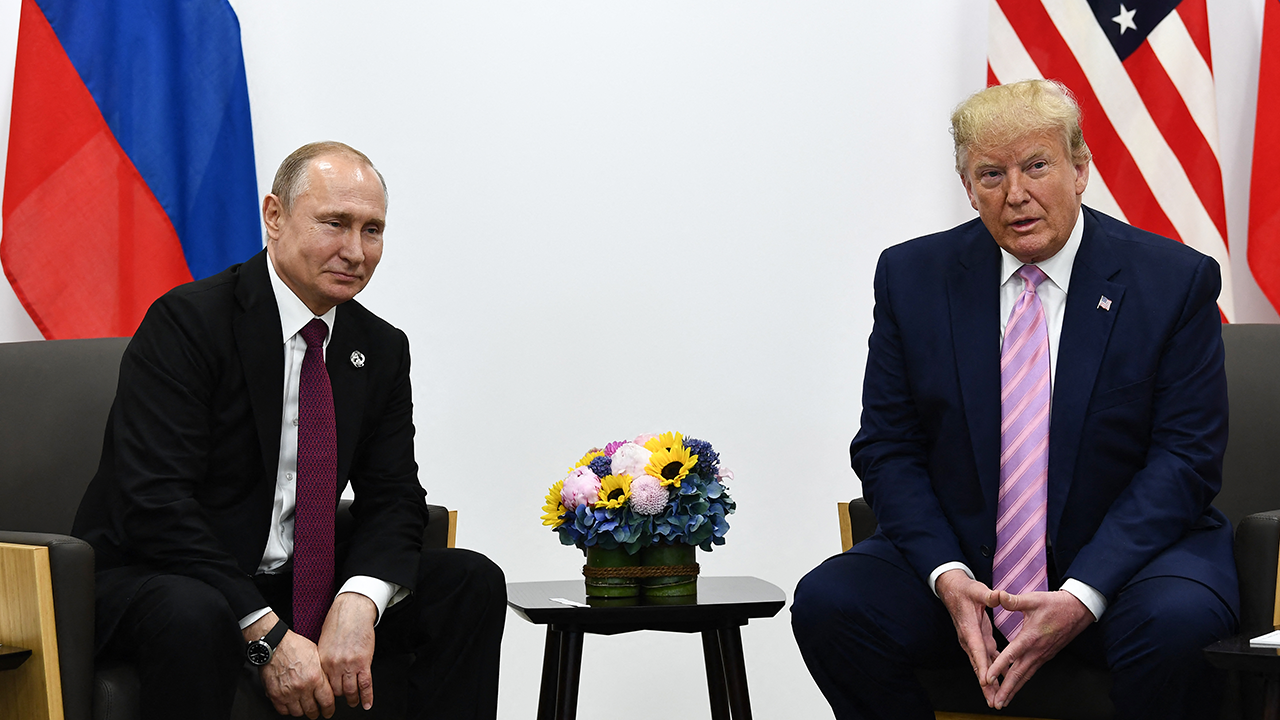
NEWYou can now listen to Fox News articles!
While President Donald Trump previously refrained from speaking ill of Russian President Vladimir Putin, those days are over.
The ongoing war between Russia and Ukraine has changed the nature of their dynamic. Although the two appeared to get along, at least publicly, during Trump’s first administration, their relationship has unraveled as the more recent conflict persists.
In recent weeks, Trump has refused to mince his words when asked about Putin. Trump said during a Cabinet meeting July 8 he was fed up with Putin and said he was eyeing potentially imposing new sanctions on Russia.
«We get a lot of bulls— thrown at us by Putin, if you want to know the truth,» Trump said. «He’s very nice all the time, but it turns out to be meaningless.»
TRUMP MOVES NUCLEAR SUBMARINES WEEKS AFTER PRAISING SUB’S POWER IN IRAN STRIKES
While President Donald Trump previously refrained from speaking ill of Russian President Vladimir Putin, those days are over. (Kremlin Press Office / Handout/Anadolu Agency/Getty Images)
John Hardie, Russia program deputy director at the Foundation for Defense of Democracies, said Russia started to attract ire from Trump dating back to March after Ukraine agreed to a 30-day ceasefire. But Russia has failed to get on board with a ceasefire.
«Really, since then, I think Trump has come to view the Russians as the main impediment to a deal,» Hardie told Fox News Digital Thursday.
Additionally, Hardie said that Trump has also grown frustrated that Russia will launch drone and missile attacks against Ukraine, even after directly speaking with Putin.
«What he’s sort of latched on to are these Russian drone and missile barrages,» Hardie said. «That really seems to resonate with him.»
Tensions only have continued to escalate between the U.S. and Russia since the July Cabinet meeting.
Trump announced July 14 that he would sign off on «severe tariffs» against Russia if Moscow failed to agree to a peace deal within 50 days. He then dramatically reduced the deadline to only 10–12 days — which ends Friday.
The decision to reduce the timeline prompted former Russian President Dmitry Medvedev to caution that «each new ultimatum is a threat and a step towards war.»
TRUMP LIFTS VEIL ON US SUBMARINES IN WARNING SHOT TO KREMLIN IN ‘CLEVER’ REPOSITIONING MOVE
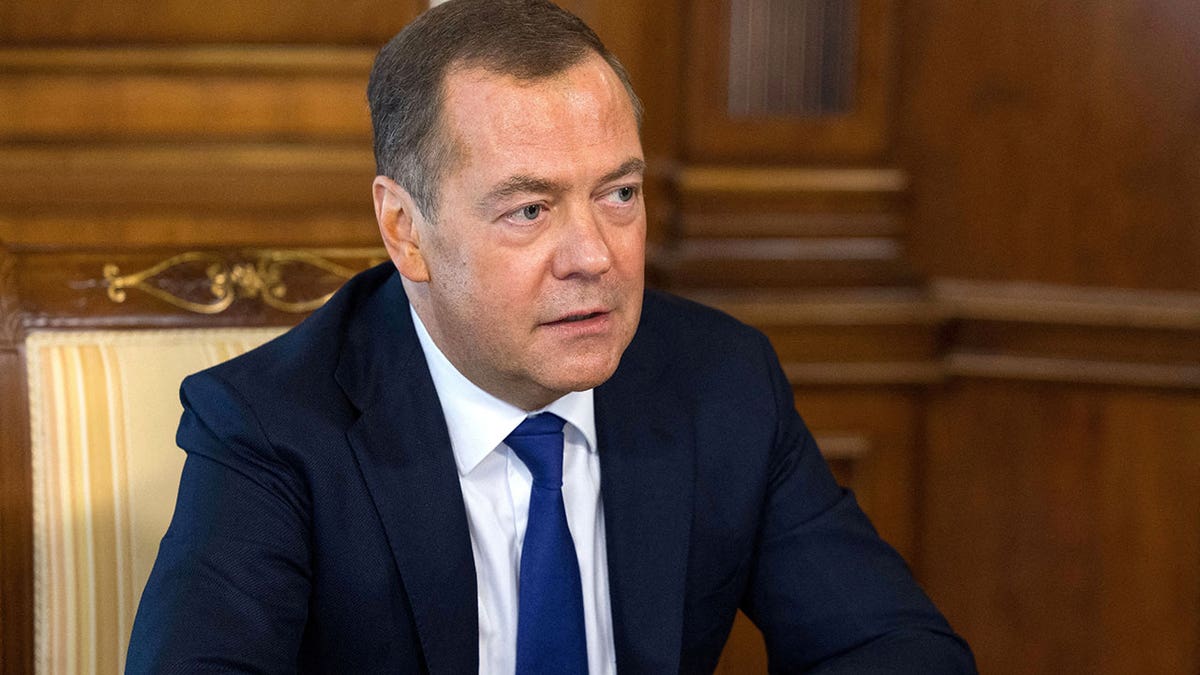
The decision to reduce the timeline prompted former Russian President Dmitry Medvedev to caution that «each new ultimatum is a threat and a step towards war.» (Sputnik/Yekaterina Shtukina/Pool via Reuters/File Photo)
In addition to economic sanctions, Trump responded to Medvedev and issued a rare statement disclosing that two U.S. Navy submarines would be moved in response to escalating threats from Russia.
«I have ordered two Nuclear Submarines to be positioned in the appropriate regions, just in case these foolish and inflammatory statements are more than just that,» Trump said Aug. 1.
Trump’s disclosure of the submarine presence puts additional pressure on Russia to come to the negotiating table, according to Bryan Clark, a retired submarine officer and director of the Hudson Institute think tank’s Center for Defense Concepts and Technology.
«We have used very sparingly submarines to try to influence adversary behavior before, but this is pretty unusual, to do it against a nuclear-powered adversary like Russia in response to a nuclear threat by Russia,» Clark told Fox News Digital Monday. «So I think this is trying to essentially push back on Russia’s frequent and long-standing threats to use nuclear weapons in part of the Ukraine conflict.»
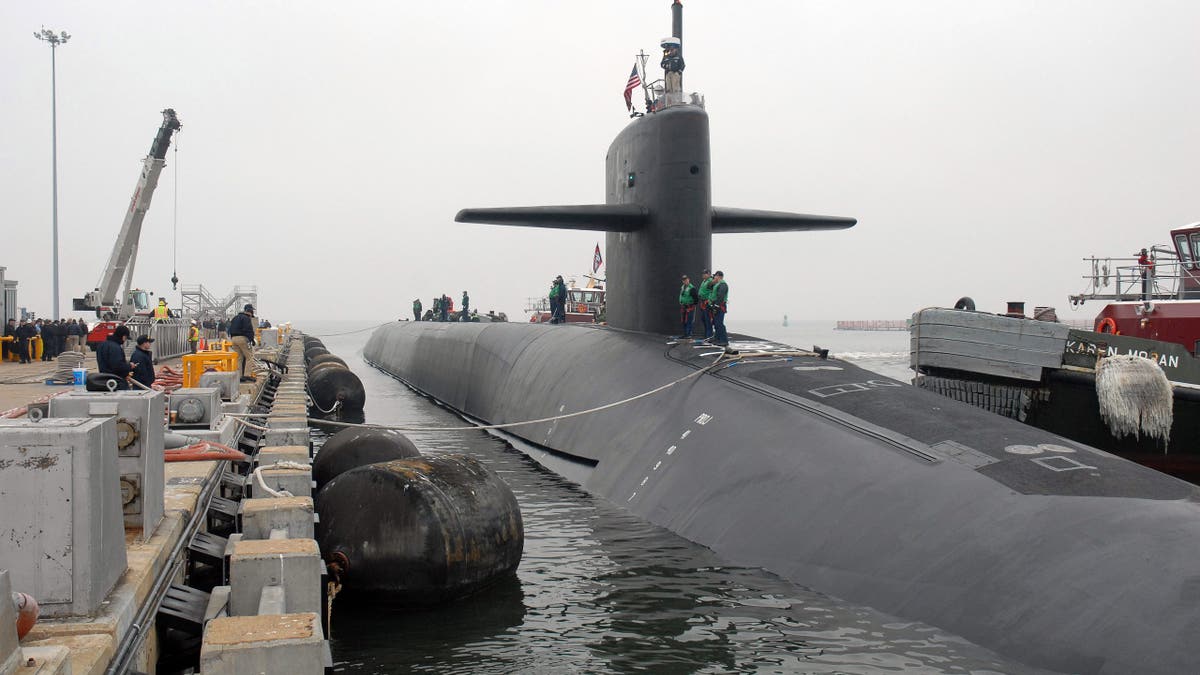
President Donald Trump’s disclosure of the submarine presence puts additional pressure on Russia to come to the negotiating table, according to Bryan Clark, a retired submarine officer.
Momentum is picking up on negotiations though, and U.S. Special Envoy Steve Witkoff met with Putin Wednesday.
Trump said in a post on Truth Social afterward that «great progress» was made during the meeting. And now, Trump and Putin are expected to meet face to face imminently in an attempt to finally advance negotiations to end the war between Russia and Ukraine.
Still, Hardie said he is skeptical that the meeting between Putin and Trump will result in meaningful progress.
«I don’t expect a summit to produce much,» Hardie said. «And I think Putin could try to use the summit to placate Trump and kind of buy more time continues assault on Ukraine, but I think his goal is he’d love to be able to enlist Trump in his effort to impose these harsh terms on Ukraine.»
Russia has pushed for concessions in a peace deal that include barring Ukraine from joining NATO, preventing foreign peacekeeper troops from deploying to Ukraine after the conflict, and adjusting some of the borders that previously were Ukraine’s.
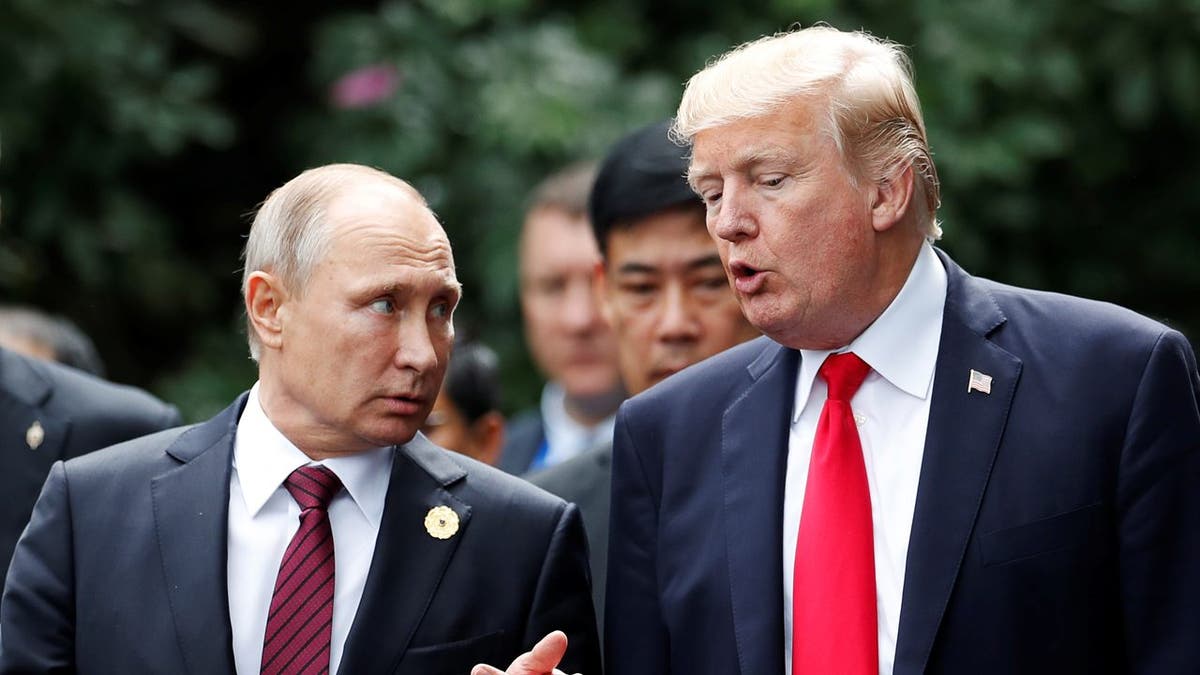
It’s unclear if Trump plans to announce any additional economic burdens upon Russia Aug. 8, 2025, in accordance with the deadline that he imposed demanding that Russia signal willingness to end the conflict. (Jorge Silva/Reuters)
It’s unclear if Trump plans to announce any additional economic burdens upon Russia Friday in accordance with the deadline that he imposed demanding that Russia signal willingness to end the conflict. But according to Trump, the ball is in Putin’s court.
«It’s going to be up to him,» Trump told reporters Thursday. «We’re going to see what he has to say. It’s going to be up to him. Very disappointed.»
The White House did not disclose any details regarding potential Friday sanctions, but said that Trump wants to meet with Putin and Ukrainian President Volodymyr Putin to resolve the conflict.
«The Russians expressed their desire to meet with President Trump, and the President is open to this meeting,» White House press secretary Karoline Leavitt said in a statement to Fox News Digital. «President Trump would like to meet with both President Putin and President Zelensky because he wants this brutal war to end. The White House is working through the details of these potential meetings and details will be provided at the appropriate time.»
white house,russia,ukraine,donald trump,vladimir putin
INTERNACIONAL
Trump to host Armenia, Azerbaijan leaders ahead of peace pledge as White House eyes Nobel Peace Prize
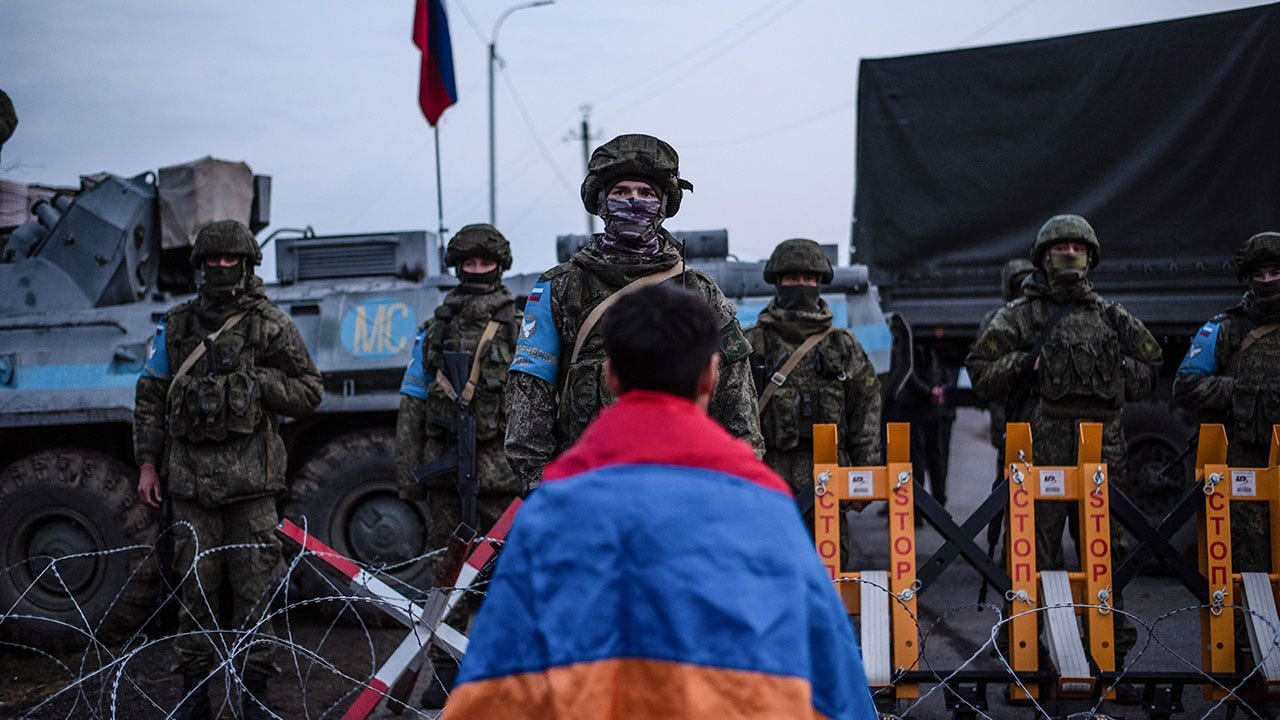
NEWYou can now listen to Fox News articles!
President Donald Trump will host the leaders of Armenia and Azerbaijan on Friday as he looks to secure one more peace deal under his belt following fighting that reignited in 2020.
«I look forward to hosting the President of Azerbaijan, Ilham Aliyev, and the Prime Minister of Armenia, Nikol Pashinyan, at the White House tomorrow for a Historic Peace Summit,» Trump said in a Thursday night social media post.
«President Aliyev AND Prime Minister Pashinyan will join me at the White House for an official Peace Signing Ceremony,» he added. «The United States will also sign Bilateral Agreements with both Countries to pursue Economic opportunities together, so we can fully unlock the potential of the South Caucasus Region.»
Azerbaijani President Ilham Aliyev, right, and Armenian Prime Minister Nikol Pashinyan meet in Abu Dhabi, the capital of the United Arab Emirates, on July 10, 2025. (Azerbaijani Presidency/Handout/Anadolu via Getty Images)
ARMENIA AND AZERBAIJAN MOVE TOWARD NORMALIZED RELATIONS AS THE FIRST BORDER MARKER IS PLACED
Despite the president’s comments, experts familiar with the ongoing negotiations have told Fox News Digital that the leaders are not expected to sign a formalized peace agreement, but rather a letter of intent following more than a year of negotiations.
However, even as an official peace agreement is not expected to be signed, the meeting is still viewed as a major win for not only regional stability, but for Trump as well.
«I believe they’ve had a significant position in this whole process,» Matias Perttula, director of Save Armenia, told Fox News Digital. «We just returned from Armenia over the last week [where] we had several government meetings, including with the national security advisor, the president of Armenia and a couple other ministries, and from what we can tell the engagement from the Trump administration has been a lot more robust than the Biden administration.»
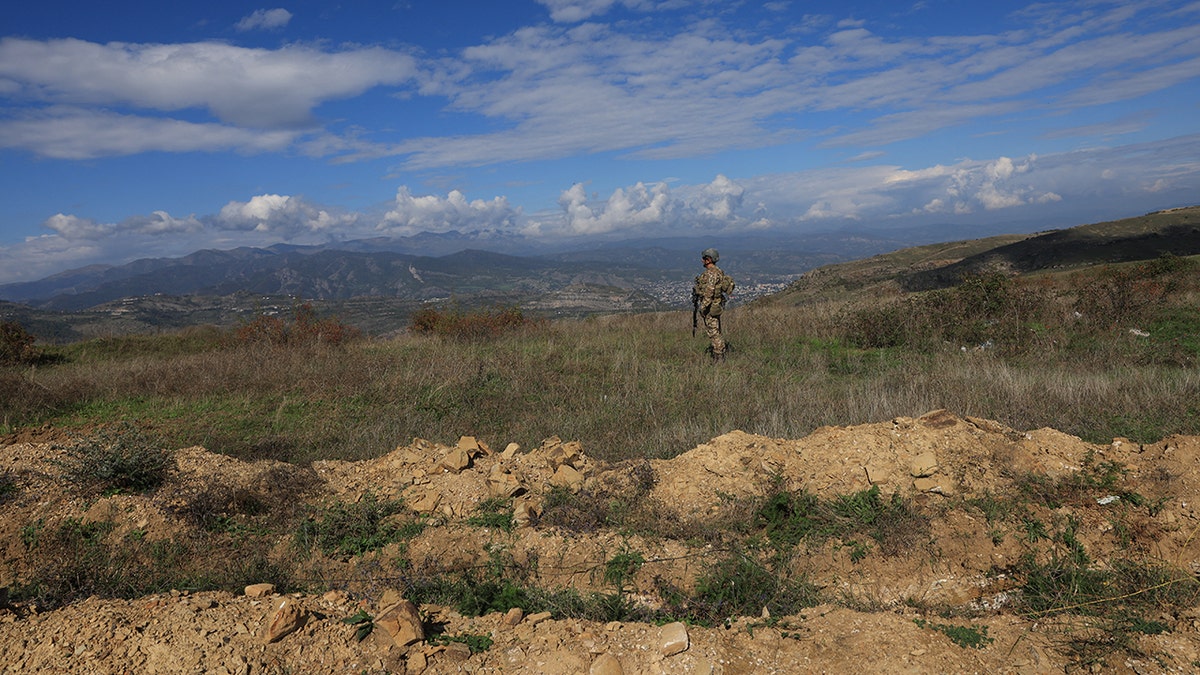
An Azeri serviceman stands near trenches at a former Armenian separatists military position in the village of Mukhtar (Muxtar) retaken recently by Azeri troops, during an Azeri government-organized media trip, in Azerbaijan’s controlled region of Nagorno-Karabakh, on Oct. 3, 2023. ( EMMANUEL DUNAND/AFP via Getty Images)
Azerbaijani President Ilham Aliyev and Armenian Prime Minister Nikol Pashinyan are each expected to meet with Trump prior to signing a pledge for peace between the two nations, which have been embroiled in, at times, brutal conflict since the late 1980s.
The conflict largely centered around the status of the Nagorno-Karabakh region, a mountainous area in Azerbaijan with a majority-Armenian population, but which declared independence in 1991.
While Armenia, along with the international community, never formally recognized the Nagorno-Karabakh Republic as an independent state, it became its chief financial and military backer.
The territory assumed a de facto role in Armenia until Azerbaijani forces overwhelmed the republic in a swift campaign in September 2023, prompting mass evacuations of ethnic Armenians before it was then dissolved on Jan. 1, 2024.
This region is expected to remain a major issue in the ongoing negotiations.
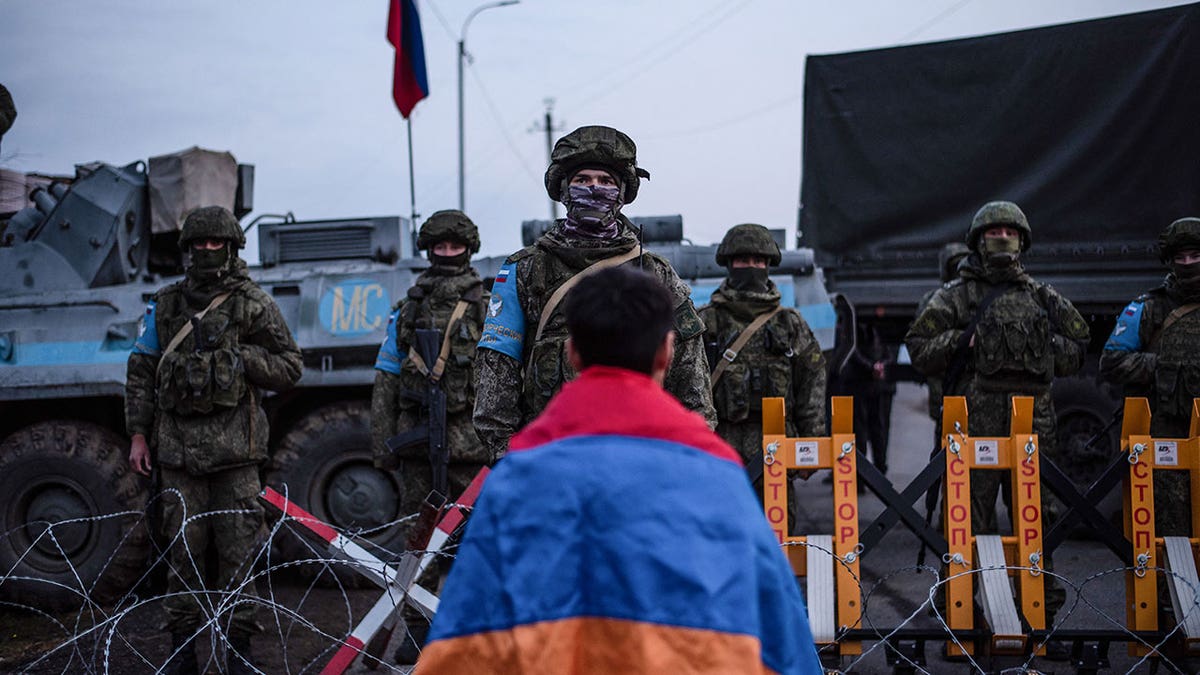
A protester wearing the Armenian national flag stands in front of Russian peacekeepers blocking the road outside Stepanakert, capital of the self-proclaimed Nagorno-Karabakh region of Azerbaijan, on Dec. 24, 2022. (Photo by DAVIT GHAHRAMANYAN/AFP via Getty Images)
ARMENIA’S PRIME MINISTER URGES SWIFT BORDER AGREEMENT TO AVOID CONFLICT WITH AZERBAIJAN
Though both nations announced in March that they had reached a consensus on finalizing a peace deal, several factors surrounding the mountainous area have prevented a finalized agreement from being reached, as witnessed in the July meeting between the leaders when they met in the UAE but failed to find a resolution.
Chief among Azerbaijan’s demands is that Armenia should amend its constitution and remove all references to the Nagorno-Karabakh territory. Though this demand is not a simple request that just Pashinyan can agree to as it would require a national referendum.
«There’s no legal consequence whatsoever,» Perttula told Fox News Digital, explaining that both Armenian and American legal experts have refuted the demand as inconsequential, and therefore should not serve as a precursor to reaching a formalized peace deal.
«There needs to be a real consideration for the right of return for the 120,000 Armenian Christians that were forced off the lands of Nagorno-Karabakh that has been their ancestral homeland for centuries,» Perttula added. «I think that needs to be a key point in terms of formalizing this whole peace agreement.»
«We want peace at the end of the day,» he added. «We want peace and normalization.»
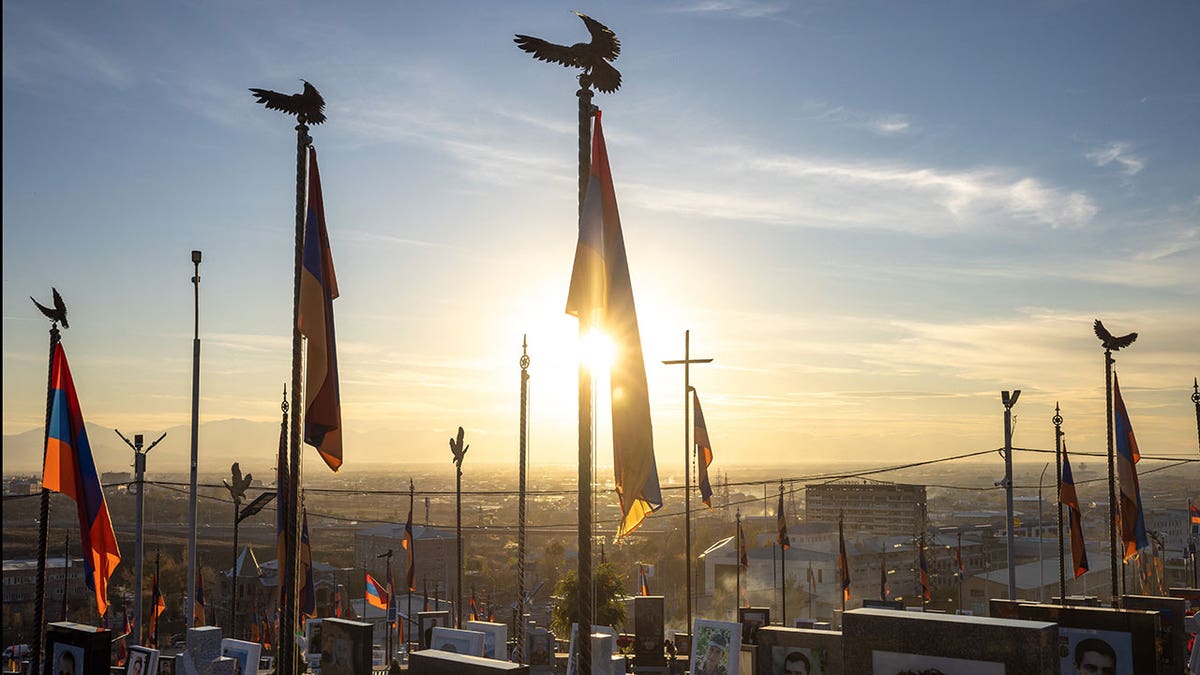
Citizens visit their loved ones at Yerablur Military Cemetery who were killed recently during September in Nagorno-Karabakh. (ANTHONY PIZZOFERRATO/Middle East Images/AFP via Getty Images)
NETANYAHU SURPRISES TRUMP WITH FORMAL NOBEL PEACE PRIZE NOMINATION DURING HISTORIC WHITE HOUSE MEETING
Trump, while on the campaign trail, highlighted the Armenia-Azerbaijan conflict and accused then-Vice President Kamala Harris of doing «NOTHING as 120,000 Armenian Christians were horrifically persecuted and forcibly displaced.»
Trump said he would «work to stop the violence and ethnic cleansing, and we will restore PEACE between Armenia and Azerbaijan.»
Trump has repeatedly championed his push to end conflict across the globe and in June celebrated a peace agreement that the U.S. helped broker between the Democratic Republic of Congo and Rwanda with an Oval Office signing.
«In a few short months, we’ve now achieved peace between India and Pakistan, India and Iran, and the DRC and Rwanda, and a couple of others, also,» Trump said during the event.
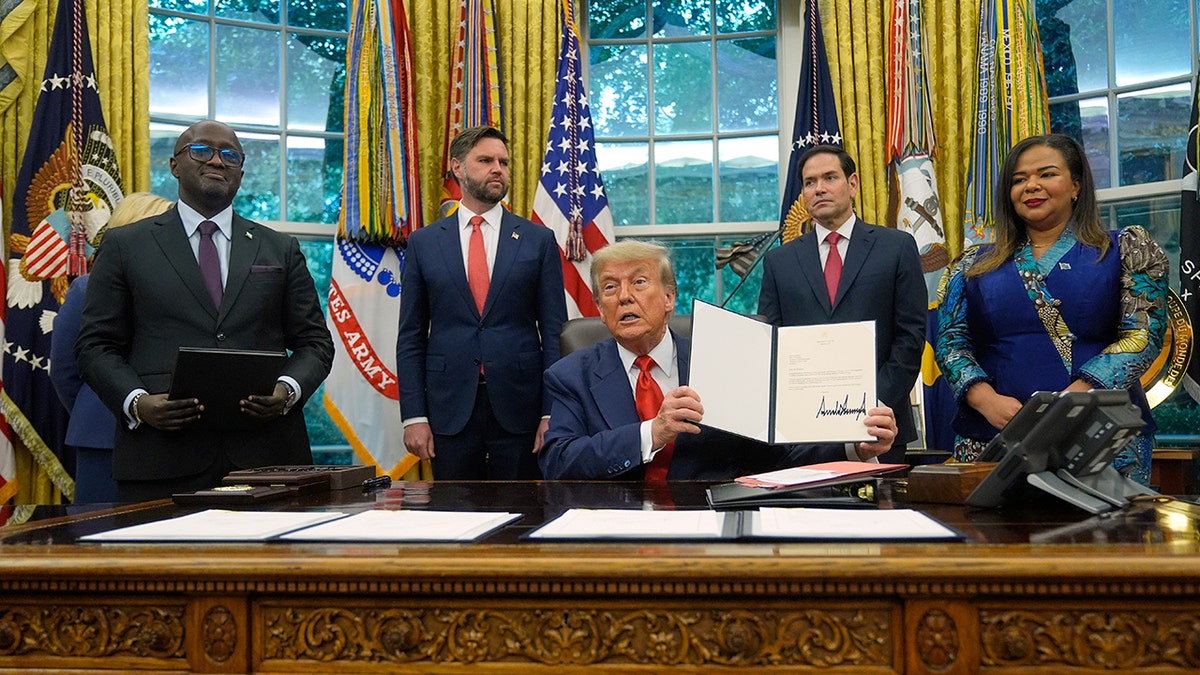
President Donald Trump holds up a signed document to present to Congo’s Foreign Minister Therese Kayikwamba Wagner, right, as Rwanda’s Foreign Minister Olivier Nduhungirehe, from left, Vice President JD Vance and Secretary of State Marco Rubio watch on Friday, June 27, 2025 in the Oval Office at the White House in Washington. (AP Photo/Manuel Balce Ceneta)
CLICK HERE TO GET THE FOX NEWS APP
The president – who has been nominated for a Nobel Peace Prize by Israeli Prime Minister Benjamin Netanyahu, as well as leaders from Pakistan and Cambodia – has on several occasions argued his credentials should be recognized under the international award that has been granted to four other U.S. presidents.
In a February meeting with Netanyahu, Trump said, «They will never give me a Nobel Peace Prize. It’s too bad. I deserve it, but they will never give it to me.»
The White House last week lobbied for the president to win the award come December when White House press secretary Karoline Leavitt said, «It’s well past time that President Trump was awarded the Nobel Peace Prize.»
donald trump,asia world regions,world,conflicts

 CHIMENTOS3 días ago
CHIMENTOS3 días agoMalas noticias para Wanda Nara: por qué la bajaron misteriosamente de MasterChef: «No va a salir este año»

 POLITICA3 días ago
POLITICA3 días agoAxel Kicillof reclamó ante la Corte Suprema $12 billones que le adeuda Nación

 POLITICA3 días ago
POLITICA3 días agoSebastián Pareja justificó el armado de listas de LLA en la Provincia: “El desafío era dar una opción diferencial”



